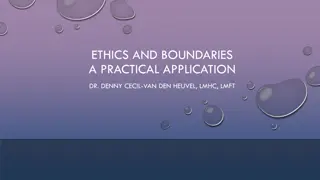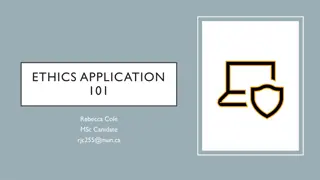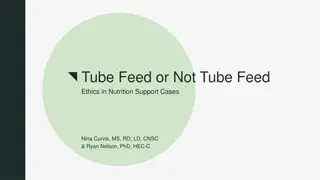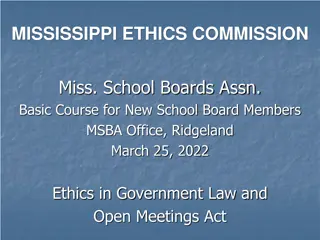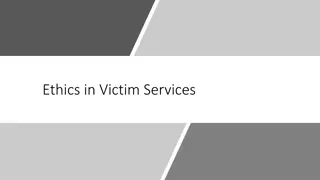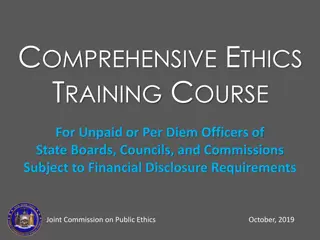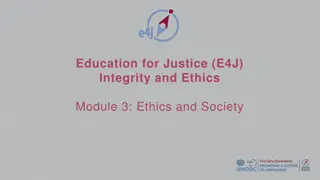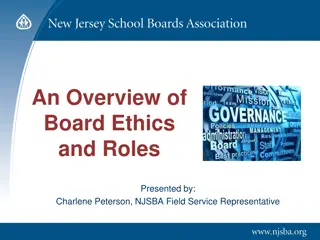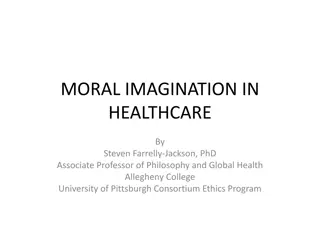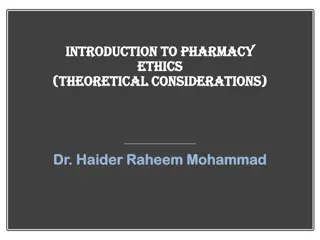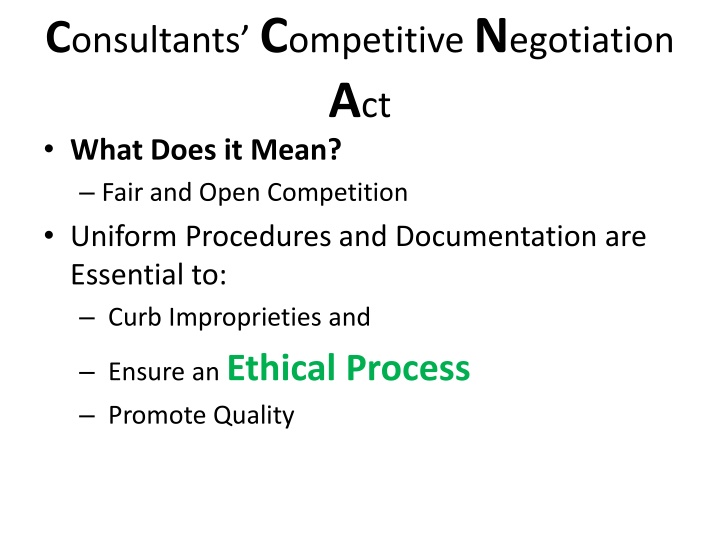
Ensuring Fair Competition in Consultant Procurement Process
The Consultants Competitive Negotiation Act emphasizes fair and open competition, uniform procedures, and documentation to prevent improprieties and promote ethical processes, aiming to inspire public confidence in the equitable awarding of contracts to qualified professionals in the fields of engineering, surveying, architecture, and landscape architecture. The system applies to government agencies and projects exceeding specific compensation thresholds, while allowing exceptions for continuing contracts within certain limits. By mandating CCNA procurement since 1973, the law prioritizes selecting the best-qualified firms based on expertise, innovation, and professional competence over cost considerations, ensuring quality outcomes and protecting the public interest.
Download Presentation

Please find below an Image/Link to download the presentation.
The content on the website is provided AS IS for your information and personal use only. It may not be sold, licensed, or shared on other websites without obtaining consent from the author. If you encounter any issues during the download, it is possible that the publisher has removed the file from their server.
You are allowed to download the files provided on this website for personal or commercial use, subject to the condition that they are used lawfully. All files are the property of their respective owners.
The content on the website is provided AS IS for your information and personal use only. It may not be sold, licensed, or shared on other websites without obtaining consent from the author.
E N D
Presentation Transcript
Consultants Competitive Negotiation Act What Does it Mean? Fair and Open Competition Uniform Procedures and Documentation are Essential to: Curb Improprieties and Ensure an Ethical Process Promote Quality
Goal? GOAL? Inspire Public Confidence that Contracts are Awarded Equitably And Ensure Competence and Safety Applies to: Engineers; Surveyors; Architects; and Landscape Architects (although I don t know why)
Who Must Use this System? All Government Agencies State County City School Board (District) Studies where compensation exceeds $25,000 Construction where the cost of construction compensation exceeds $250,000.
What About Continuing Contracts? The Law Stipulates that Consulting Firms providing Professional Services under Continuing Contracts Shall Not be Required to Bid Against Each Other. Studies Where Compensation Does Not exceed $200,000. Construction where the Cost of Construction Does Not Exceed $2,000,000.
Why Use CCNA Procurement? Because its the Law since 1973. The Owner Selects the Best Qualified Firm Promotes a Team Approach Encourages Technological Innovation The Owner is not Limited to the Low Bidder Protects the Public Against Abuses of the Low-Bid System and Safety Lapses Provides Life Cycle Savings
We Aren't Selling Pens Engineers Provide Professional Services; not Commodities (i.e., we are not interchangeable) We Provide: Technical Expertise Innovation Latest technology High Degree of Professional Competence Intellectual Capital
Lowest Engineering Cost v. Lowest Project Life Cycle Cost A Design Team s Approach Changes when the Design Processional's Fee Becomes a Major Criterion. The Lowest Priced Design Effort may Lead to Inferior Project Performance with Attendant Higher Construction or Operating Costs Price has NO MEANING except in terms of the Quality of the Product. Dr. W. Ed Deming
Typical Cost-Cutting Measures AVOID: Using less experienced personnel and/or evaluating fewer alternatives Developing Plan Sets with Minimal Details Selecting the System that is Easiest to Design over that which may be More Cost Effective in the Long-term Reduced QA Review
Solicitation Language Beware of: Requests for Personnel Billing Rates RFP Points for Proposing Fees (Hourly or Lump Sum) Pricing in Some Other Form Level of Effort Fixed Timeframe for Completion
Quality First Fundamentally, would you rather have a Ferrari or a Russian Lada? Do you Want to Go to War with the Low Bid Arms Manufacturer? How About The Doctor/Dentist? Appropriate Level of Knowledge Skill Reputation Past Performance Technical Competence
How Does a Qualifications-Based Selection Process Work? The Owner identifies the General Scope of Work and Develops a Selection Schedule The Owner Issues a Request for Qualifications The Owner Evaluates the Statements of Qualifications The Owner Determines a Short-list of Qualified Firms to Interview The Owner Conducts Interviews and Ranks Firms
Negotiating The Contract The Owner Invites the Top-Ranked Firm to Assist in Defining a Detailed Scope of Work The Design Firm Develops and Submits a Detailed Fee Proposal, based on the Agreed Upon Scope of Work When the Fee is not Acceptable (i.e., the Ferrari), the Owner and Design Lead work to Modify the Scope, Schedule and Budget to seek Agreement on an Acceptable Fee
Piss Off! Now What? If an Agreement Cannot be Reached with the Top-ranked Firm, Negotiations are Ended and New Ones Begin with the Next Most Qualified Team Eventually Execute an Agreement The Owner must Provide Post-Selection Feedback to the Teams Involved in the Process.
Benefits of the QBS Process Life Cycle Cost Considerations Team Building Technology/Innovation Reduced Changes Flexible Contract Approaches Competition Among the Best Performers; Not Low Bidder Pieces of CRAP
Why Not Just Get the Pricing from 3 Top Performing Firms Each Firm will Price the Project based on their own Interpretation of the Scope and not Necessarily that of the Owner. Each Price represents a Unique and Unilateral Scope Since we all have labor rates, overhead and profit structures that are somewhat similar, the only option is to cut scope and innovation first to be competitive
Price is Still a Factor. Why? Where does Client Satisfaction Rank in Your Mind? Where does Reputation Rank? Where do Inflated Fees vs. High Quality (Value) Rank? Where does Safety in Design Rank? Who Likes Change Orders? Who Likes High Project Maintenance Costs?
Ethics February 19, 2015 Who Are These People? What Do They Have in Common?
Does Lying on your Resume Matter? Your actions have potentially far-reaching consequences May have serious effects on other people; Unethical behavior tends to come back to haunt you! Honesty rests on three things: Truth, Consistency, and Candor.
What is the Purpose of a Resume? to highlight valuable experience to show a potential employer that you have the skills sought BUT Your resume does not get you a job, it gets you an interview.
Where is the Line? ______________________________ Sometimes your balancing on it Sometimes your holding on to it Sometimes your hanging from it BUT NEVER LET IT GO
When Does the Truth Get in the Way of a Good Story? Changing the dates of your previous positions to hide any gaps of unemployment Saying you have a degree that you actually don t have Having job titles and descriptions that aren t completely honest Saying you have experience or skills in an area that you don t have Forging recommendations letters
Beware of Social Media Employers are wise to creative marketing techniques Google searches may be reveal a list of social networking websites where job candidates post the status of their daily lives, including: Evidence of inconsistencies from that described in the resume indiscriminate personal activities and photographs that they may not want potential employers to see.
Robert Irving British Chef Creator and Face of Food Network s Dinner Impossible In 2008, was fired from his own show on Food Network He didn't actually design the royal couple's wedding cake, rather he only attended the school where it was made.
Marilee Jones Dean of Admissions (MIT) Was employed by the Massachusetts Institute of Technology for 28 years She never received the the undergraduate or Masters Degrees that she referenced on her resume. In fact, Jones never received any college degrees.
Jeffrey Papows, President of IBM's software maker - Lotus Development Fibbed about his academic and military background, stating that he was a pilot when he was actually an air traffic controller and a captain when he was actually a first lieutenant in the Marines. He also said he got his PhD from Pepperdine, but actually got it from an unaccredited correspondence school.
Ronald Zarrella - Bausch & Lomb CEO Left his post after it was revealed that he never received his MBA from NYU like he claimed he did. He actually started the program, but never finished it.
David Edmondson, Radio Shack CEO Joined Radio Shack in 1994 and quickly advanced in the company until he became CEO in 2005. A year after attaining his new title, it was revealed that he did not receive degrees in theology and psychology from Heartland Baptist Bible College as he had claimed.
Kenneth Lonchar, Veritas Software CFO Joined Veritas Software Corp. through a merger in 1997. Four years later, Lonchar won CFO Magazine s Excellence Award, but the next year, it was revealed that he never received an MBA from Stanford as he claimed. He never even earned the accounting degree he said he did from Arizona State.
Scott Thompson PayPal President and Yahoo CEO On Scott Thompson's resume, he had a degree in computer science from Stonehill College. He lied
George O'Leary Never Even Played the Game 5 days after being named Notre Dame s head coach, he was forced to resign for lying about a master's degree in education from New York University that he never received. In fact, he never even graduated. He also told his employers that he played college football for three years at the University of New Hampshire, but, in actuality, he never even played a game of football. He was also the Head Coach at UCF.
Steve Masiello, USF Never graduated from the University of Kentucky, as is indicated on his r sum He had been offered (and verbally accepted) a five-year deal worth more than $1 million a year to become USF's basketball coach
If Not Outright Fabrication, What of? Claiming a degree that was not earned because you did most of the work and were only a few credits short. Creating a more impressive job title because you were already doing all of the work of that position. Claiming a team's contributions as your own, because other members did not carry their weight. Inflating the number of people or range of functions for which you had direct responsibility because you really did have a great deal of influence over them
So Where is the Line? You need to decide that for yourself. Other-shoe test. How would you feel if the shoe were on the other foot? What assumptions would you draw and would they be accurate? Front-page test. Would you think the same way if your accomplishment in question were reported on the front page of the Wall Street Journal? When in doubt, find a third way. Create a relevant experience section to reveal a sustained interest or commitment which makes up for a dearth of paid employment. Volunteer work, Fieldwork, significant extra-curricular activities, and even coursework Describe jobs in which you learned a lot from your own supervisor and thus gained insight into the qualities of a successful manager.
There are ethical ways to beef up your resume, such as the following: Prioritize the information on your resume Your most relevant experience for the position you are applying for. Consider putting your educational information on the very bottom of your resume and your professional experience, skills, and certifications sections at the top. Present your GPA in major, or a description of relevant coursework, or a brief description of a thesis or project Focus on your bullet points. By adding specific details and accomplishments For example, change waited tables to managed up to 10 tables at a time. Compliment your text resume with a video resume Show off your soft skills, which you can only describe on your text resume.
What if you do get an offer? Don t accept the job offer on the spot. When do they need your answer and request a week to consider (the company should appreciate that you are not accepting impulsively). Never act simply on intuition (take the time to weigh out the pros and cons of each offer and to assess the likelihood that the better offer will come through). Ask for a written confirmation of the offer. This, too, will help buy some time. Attempt to modify the offer received to make it more attractive. Ask to speak with the person who would be your direct supervisor. This will give you a chance to ask some candid questions about the job itself, scrutinize the firm more closely to see if it is a fit, and buy a little extra time.
BOTTOM LINE If clients don t trust you they will eventually stop doing business with you. It doesn t matter how smart you are.
Typical Albergo Interview Questions What do you do differently than others when: Approaching a serious work problem Preparing for a difficult exam You have too much on your plate Dealing with a confrontational team member or one that did not pull their weight You had to gain the cooperation of a group over which you had little authority
Typical Albergo Interview Questions Do you believe that some rules should be obeyed more closely than others? What one trait distinguishes a superior employee? How do you intend to gain the technical knowledge that you lack as you start your career? What do you see as the most important development occurring in your field today, and what impact will it have?
Typical Albergo Interview Questions What career-related publications do you normally read? What is your greatest weakness? If you started tomorrow, how could you contribute right away? Are you familiar with our corporate culture? How would you fit in?
Interview Questions to Consider in Advance Why should I hire you?
How Important are Relationships to Professionals? My list of Non-Negotiable Standards Never Always Say No or That can t be done Criticize team members, competitors, or make excuses Show frustration Seem distracted Present options, providing what can be done Own it, even if it s not your error Maintain your composure Remain focused on your client Let them know that you will find out Say I don t know

